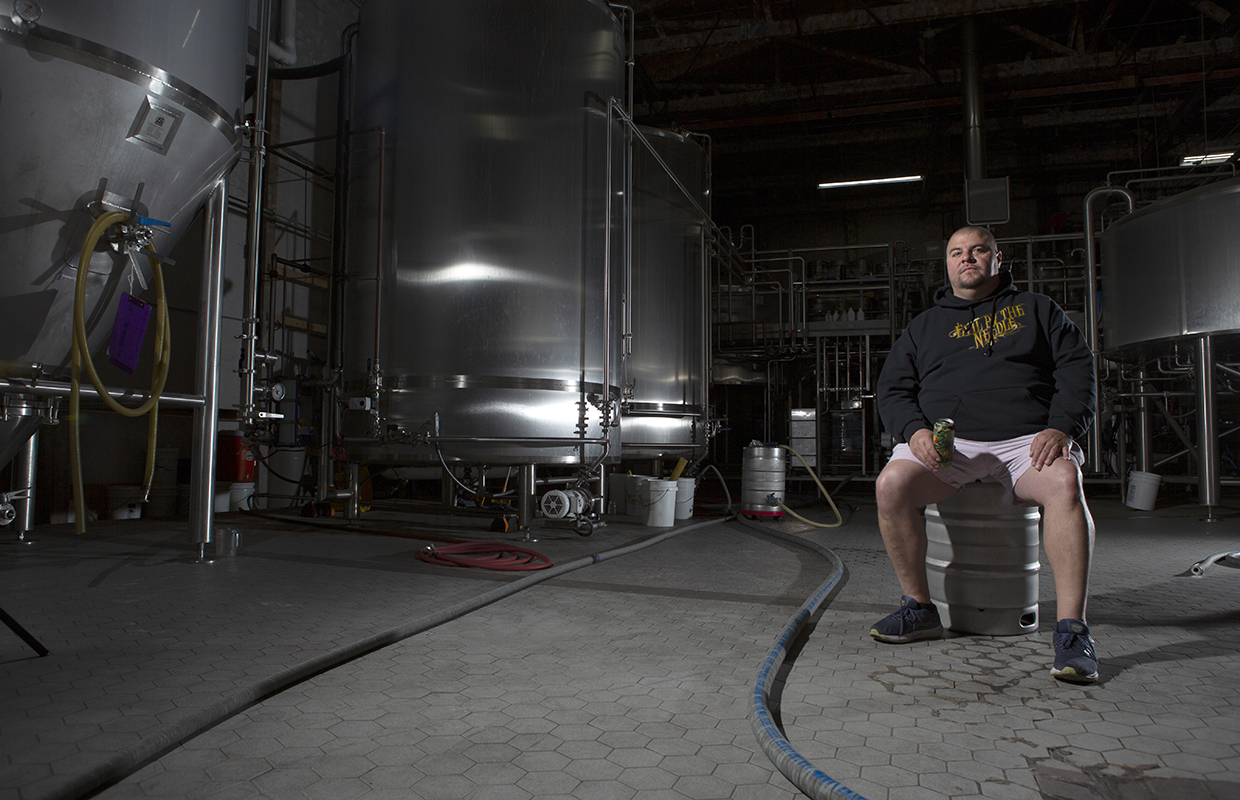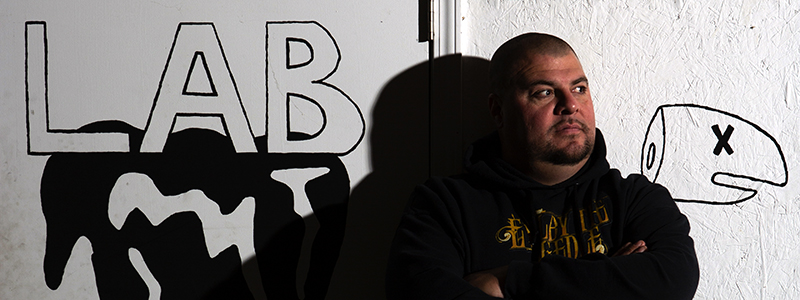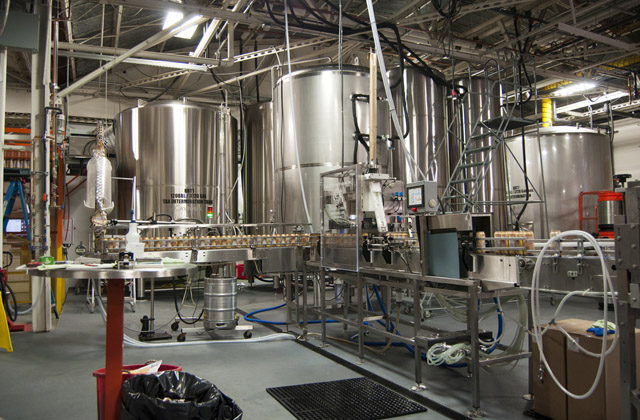
Rather than push forward with what could be false growth opportunities, and heading into its 12th year of business, Against the Grain co-founder Sam Cruz is happy to speak openly about how his brand is accepting that being flat in growth is about the best that some breweries can do right now.
“Because of the changing drinking culture and format requirements in the chain environment, and really, the way people drink now it’s much more localized, it’s hyperlocal at this point,” Cruz said. “We’re assuming a decline. We actually see our production needing to recede in order to maintain our quality and our identity. So for us, the plan is to grow down a bit. And to focus in on the markets that make the most sense, economically and ultimately, culturally, for us as well. That would be hyperlocal.
“Louisville matters. It always mattered, but it matters even more now.”
The first cover story feature done by The Brewer Magazine in the debut issue (Winter 2014), Against the Grain was an up-and-coming brewery in the Louisville, Kentucky market with beer being shipped to more than 35 states within its first three years along with some going overseas. The team of Cruz, Jerry Gnagy, Adam Watson, and Andrew Ott launched the brand in September of 2011 as a brewpub nestled into the confines of the local minor league baseball team’s park that wanted to do more. Much more. And they did. The brewery saw growth year after year and by 2019 was eclipsing 10,000 barrels with hopes of doing 15,000 in 2020 while also being in talks with Pabst Brewing for a partnership.
Although the pandemic did quite a number on the company — dropping production to around 4,000 barrels in 2022, with plans to reach 6,000 by the end of 2023 — Cruz came through the ordeal a more centered individual and a wiser business owner.
“We have a bifurcated kind of view about this,” Cruz explained. “We’re a distribution brewery … we’re in 19 states at this point. But I want to say 80% of that volume sales are in three of them, with the vast majority in Kentucky. With that being said, there is still marketshare out there for distribution, but we can’t continue to maintain our business with the idea that it will be something that is there for good. We have to become far less dependent upon spreading our product out so broadly. The market is pretty saturated right now as we’ve got about 9,500 breweries in the US.
If you’re going to distribute, Cruz said, you have to have the physical presence in markets and have feet on the ground.
“That’s a pretty hefty investment,” he said. “Realistically to keep up with the living wage in most places, I’ve got to sell 30,000 cases in a market for a person to make sense. That’s a pretty big bite. A lot of distributors, you ask them for that and they’re shaken.
“That’s a home thing, that’s not necessarily a thing you have out there. … It’s not really a viable or feasible plan to have that many employees in far-flung markets because of that.”
That thought process for Against the Grain has had a pretty dramatic impact on how the brewery looks at its distribution plan.
“We really think of the icing on the cake is anything outside of our big three, which would be Indiana, Kentucky, and Illinois,” Cruz said. “We began focusing on what we can control the most, the local market where it makes more sense, it resonates more with our core consumers. And we see the benefits.”
As for Against the Grain’s own on-premise, Cruz said they are strong.
“We’re a restaurant in a major tourist venue,“ he said. The original brewpub location is a part of the Louisville Bats baseball stadium in downtown Louisville. “We see a lot of opportunity there as well and there’s certainly room for growth, in regards to it being an on-premise environment, but the sale of beer is a different story.”
Despite strong sales, Kentucky is the state for Bourbon, and with the rise of spirit sales — Cruz said on-prem spirit sales in the brewpub have risen to nearly 20% of all beverage sales — they have had to plan accordingly to adjust for production and sales.
“We’re still doing pretty significant revenues,” he said. “It doesn’t really change our model in that regard. But I’ll go back to that 9,500 breweries in the US, the vast majority of them are non-distributing, taproom-based, on-premise environment spots. In Louisville alone, we’ve seen an explosion of taprooms to where the consumer base has been. It was pretty isolated to a few breweries when we started, and now is spread out amongst many.”

Cruz said he is starting to see those consumers become brand loyal to a degree.
“Maybe more so neighborhood-loyal to their little geographical pocket,” he said. “Because of that, we see a pretty defined reduction of local customers. Everyone’s got their brand.
“It seems like doom and gloom or grim in that regard. But it’s not it. This is the nature of what we do in this business. We signed up for this, this is what you actually do when you’re an entrepreneur. You weather storms and you navigate through challenging times and evolve, and adjust to see them survive, or to exist, in a space. That’s kind of where we are. Now we’re in that evolution phase.”
The major innovation for 2023 has been the Cold Ass Beer brand, an Amber Ale. It has been a popular tap handle so far and could see more growth in off-prem and retail soon.
“The reason we went down that road is New Belgium,” he said, explaining that the change in style of Fat Tire from an Amber to a Golden gave them an idea.
“It left a huge space for anybody to step in and take some marketshare, and you don’t really need to have it all to benefit dramatically,” he said. “We saw that opportunity and thought, well, why don’t we produce an Amber Ale that’s affordable, that still fits that same pricing model that they had set.
“It’s a brand that we want to explore and can play with and have fun with, and get out there. And we’ve had a lot of success with that. That’s been pretty exciting, just to see what a simple Amber Ale can do. Whenever a big huge player decides they don’t want that space. I wonder who else is capitalizing on that.”
What Cruz and Against the Grain has learned is to set more concrete and defined goals.
“Looking back, I think there were always short-term goals, not long-term,” Cruz admitted. “Short term: Build a bigger brewery; short term: Grow our production to a certain point. And we met a lot of those. Some of them we didn’t, it’s the nature of business. But we did meet a lot of them, maintain a good culture, be a part of the community of Louisville, be good to our people, grow people, grow their experience and their opportunities in life.
“A lot of altruistic things that we’ve wanted to do that we were able to do. They were not so much spoken — they weren’t a part of our business plan. But they were part of our everyday plan. So we have been able to do those things.”
Ownership and management functions are far more fluid now than it was, Cruz said. In the beginning, Cruz, Gnagy, Watson, and Ott each gravitated towards their “natural talents” that each had.
“We deferred to each other because we didn’t know how to be critical of each other,” Cruz said. “That actually was a really good way to grow and flourish, as each of our roles required that to get to our point of success. I just had a conversation the other day with one of my partners. We’re talking about the restaurant books, the numbers, what to expect, where we need to have areas of concern, or where can we pinch something to do something different, or change. And it kind of dawned on me then, I was like, we’ve been doing this for so long with this is, I’m a restaurant manager, I’m a restaurateur. I had never set out to be one, but I am. In addition to that, we own real estate. I’m a landlord also, you don’t think about it, but I am. And then I’m a brewer. I haven’t brewed in 10 years. But I have to be aware of what’s happening and how it works.
“I think the same holds true for my partners.”
The roles have changed, as Watson has taken a step back to work in the nonprofit sector more, giving the other three more administrator duties to split.
“In the sense … we built a community,” Cruz said. “We created a lot of opportunities for people. We were the leaders at a certain point, but we share it now with a lot of people. It’s also afforded us more of an opportunity and time to focus internally on this place, our brewery, and our business, and not necessarily be so outspoken about everything out there.
“It’s actually nice to not have to have an opinion. But that being said, we’re more involved here.”




Be the first to comment